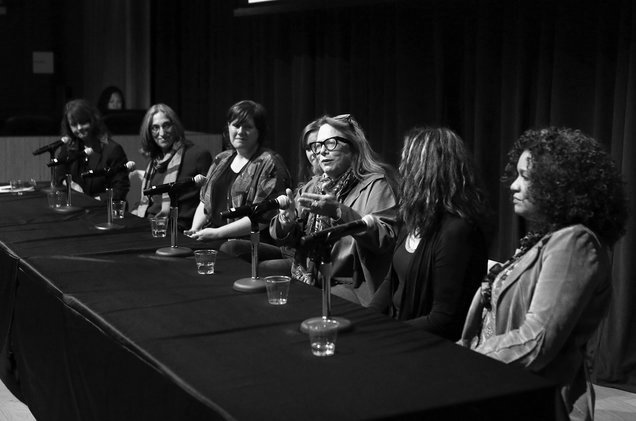Make yourself aware of the film industry, take initiative, and love what you’re doing.
Those were some of the expert tips shared at the speaker series panel hosted by the Women in Film (WIF) advocacy group.
WIF hosted their “Female Composers in Film: Balancing the Scales” panel on Wednesday night (March 27), which featured an all-women panel of some of the leading industry experts. Music supervisor Tracy McKnight (Free Solo, A Wrinkle in Time) moderated the panel and guided a conversation about the current state of the field, while acknowledging the gender inequality gap in the industry as well as ways to increase the inclusion of more women in film scoring.
The panel was made up of a diverse group of six esteemed women who have made achievements in their careers as composers: Miriam Cutler (RBG, Love Gilda), Starr Parodi (The Starter Wife, Conversations with Other Women), Kathryn Bostic(Clemency, Toni Morrison – The Pieces I Am), Laura Karpman (Set it Up, Paris Can Wait), Heather McIntosh (Compliance, Z For Zachariah), Amie Doherty (Here & Now, Marooned).
“Female composers are the most underrepresented group in Hollywood,” McKnight said, starting off the conversation.
McKnight referenced USC Annenberg’s 2018 groundbreaking study, “Inclusion in the Recording Studio?”, that noteably revealed the inequality gap in the music industry. Specifically, the statistics showed that just 1.4 percent of all film composers were female.
As disheartening as the numbers were, the women on the panel discussed why they got into the industry, and how they navigated finding a career as a woman in the space.
Miriam Cutler, a member of the Documentary Branch of the Academy of Motion Picture Arts and Sciences, described her experience as: “It was a very long road for me in terms of finding out where I belong. It’s really important to know yourself and honor your inner artist, and work on things that really reinforce those values. I had to approach my career in a more proactive way.”
Having to be more proactive is one thing many women on the panel could relate to, but the publishing of the study also sparked efforts of change within the community. “I think now there’s beginning to be a sea change. I joined the Academy in 2015, and when I joined the academy, I was the first woman composer admitted since 1996… The first one admitted in 20 years,” Laura Karpman, the first female Govenor of the Music Branch of the Academy of Motion Picture Arts and Sciences, said. “I crawled my way onto an executive commutiy, and I advocated that year for a lot of women. So, immediately we were able to change the culture. I suddenly got access to the experiences that my beloved male colleagues had for years.”
The women on Wednesday’s panel had one undeniable thing in common: a realization to work and build with the women around them. That reality was said most plainly by Kathryn Bostic, the first female African-American score composer in the Academy of Motion Picture Arts and Sciences, who “learned the art of collaboration” through working with the people around her. “An important resource to have is your community, people who support you,” Bostic said of her experiences.
Heather McIntosh also touched on the importance of community, saying that, “It’s great working with like minded people, but you’re also thinking about ‘How can I bring my team with me?'” As many other women on the panel nodded their heads in agreement, Starr Parodi, president of the Alliance of Female Composers, acknoweledged how she believes women can more proactively make their way into these spaces. “We need to get women’s music more into the mainstream of consciousness. Half of the people on the planet are women. When women can actually see that another woman has done the score, it means something to them.”
Amie Doherty agreed, and suggested that “blind listens” are another way to combat inequality and incorporate more women into the industry. “It’s a beautiful thing when someone can just listen to the music… When they take off all the names and scramble the music so that they don’t know if they’re listening to male or female.”
WIF’s mission is to advocate for and advance the careers of women working in the screen industries – to achieve parity and transform culture. While the scales are tipping and female composers are gaining more opportunities in the workplace, there’s still a long way to go before diversity and inclusion become the rules rather than the exceptions. But alliances like WIF are striving to give a platform to the rise of outspoken voices, both male and female, who are pushing to create more equal opportunities.
“It’s not as easy as just getting here and joining because you’re a woman,” Doherty said. “You still have to fight your own fight and each one of us still has to be amazing on our own time. We all have to fight together.”


